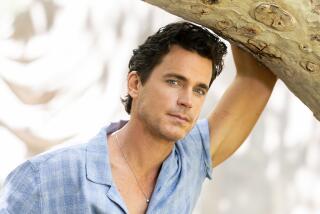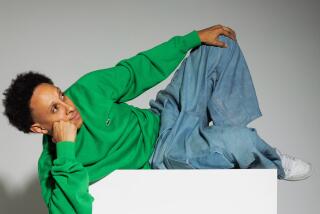Despite the daily indignities, Drew Tarver enjoys being one of ‘The Other Two’

“The Other Two” star Drew Tarver shares his character Cary suffers from internalized homophobia
When you’re an overnight sensation at just 13 years of age, life can be a series of premieres and award ceremonies and video shoots. When you’re the grown siblings of said sensation, life can be about the little things — pretending to like people to glom onto their Instagram followers, having no idea what to do with your life, auditioning for ads in which you smell someone’s gas.
On Comedy Central’s “The Other Two,” some characters, especially the industry types, are easy targets for mockery. But by far the most frequent recipients of casual humiliations and daily indignities are the protagonist brother and sister Cary (Drew Tarver) and Brooke (Heléne Yorke). And more often than not, they bring it on themselves.
“Absolutely,” said Tarver in an Emmy Contenders chat at the Los Angeles Times video studio. “We are the ones who are wrong in every scenario. Even though we are technically the ‘normal’ ones in the show, or the straight men, or the ones who are reacting to everything, we are the ones who are being gross most of the time and have the wrong idea, the wrong motivation. And we’re constantly just falling flat on our faces.
“This is throughout the whole season. And it’s kind of devastating to watch at times,” he said, chuckling.
WATCH: 2019 Emmy Contenders video chats »
While little brother Chase (Case Walker) and mom Pat (Molly Shannon) seem to glide above the fray, Cary and Brooke are as greatly unwashed as it gets. Cary is a struggling actor — Brooke is just struggling — and the things they do to get ahead can sometimes not be pretty.

For instance, Cary (who is gay) meets the “Insta-gays,” a group of good-looking gay men who are social media celebrities for doing little more than posting shirtless photos of themselves promoting products. Cary looks down on them as shallow and untalented, but insinuates himself into their sphere to increase his own follower count.
“ ‘They’re garbage,’ ” Tarver says Cary thinks of them. “But [show creators and former ‘Saturday Night Live’ head writers Chris Kelly and Sara Schneider] do such a great job … they’re actually very nice guys. You could have written those characters so one-note and so unlikable, but they’re the normal ones and Cary is the one being gross, showing up, trying to get in the photo with them. And treating them terribly. The whole time, he’s the wrong one in the episode. It’s such a nice thing to watch, when the main character is wrong.”
The show gets mileage out of casually backhanding Justin Theroux (the family is renting the actor’s New York apartment — in the show, a kind of scary space drawn in hard lines that seems like it could easily be housing a secret sex dungeon), though Tarver says the real Theroux is in on the joke. It also revels in the ultra-shallowness of Chase’s manager Streeter (Ken Marino) and the apparent simplemindedness of Brooke’s ex, Lance (Josh Segarra).
But even those characters turn out to have dimension to them, becoming among the most sympathetic on the show. And while the series gets some laughs out of Cary’s sexual awkwardness, as when his brother has a hit with a well-meaning pop song called “My Brother’s Gay and That’s Okay!” — there are also unspoken, deeply uncomfortable truths present.

“There’s a great moment in one of the scenes that kind of sums up what Cary’s dealing with,” said Tarver. “He’s at a gay bar and a guy comes up to him … they’re in acting class together. He tells Cary, ‘I didn’t know you were gay.’ And Cary goes, ‘Oh, thank you.’ And then the other guy’s like, ‘Oh, that wasn’t … that’s not something that you should feel excited about, that you were passing.’
“What does that mean for Cary? What is he going through at that moment? I think a cool thing about this show, I hadn’t seen a bunch of queer characters who were messy in that, in dealing with what it’s like to live life after you come out. Most shows are like, ‘Here’s where you come out,’ and you do, and everything’s fine. And this is more, ‘Cary’s out, he’s trying to be an actor, he’s trying to be publicly out, but he’s making missteps and figuring himself out and what that means.’
“So it’s a very good look at what it’s like to live life after you come out and things that you struggle with.”
To see the entire interview, click on the video below.

More to Read
From the Oscars to the Emmys.
Get the Envelope newsletter for exclusive awards season coverage, behind-the-scenes stories from the Envelope podcast and columnist Glenn Whipp’s must-read analysis.
You may occasionally receive promotional content from the Los Angeles Times.







